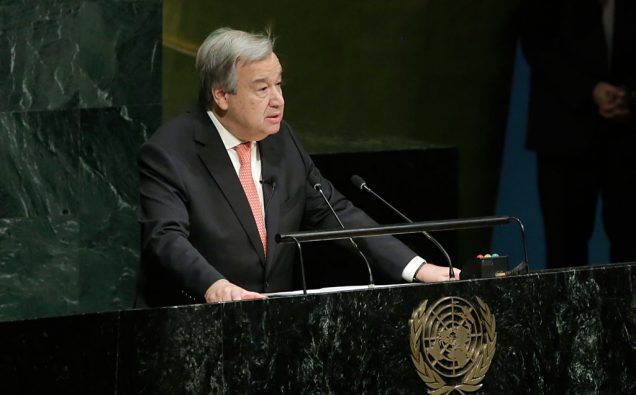
António Guterres, UN Secretary-General-designate speaks to the General Assembly after taking the oath of office for his five-year term which begins on 1 January 2017. UN Photo/Evan Schneider
Sworn in Monday as the ninth and next UN Secretary-General, Antonio Guterres pledged to reposition development at the center of the Organization’s work and ensure that the UN can change to effectively meet the myriad challenges facing the international community.
“The United Nations needs to be nimble, efficient and effective. It must focus more on delivery and less on process; more on people and less on bureaucracy,” Guterres said.
The former Portuguese prime minister Antonio Guterres was sworn in as the ninth Secretary-General of the United Nations a solemn ceremony in the General Assembly hall, succeeding South Korea’s Ban Ki-moon who steps down at the end of the month.
The challenges awaiting the new UN chief range from traditional conflicts raging in the Middle East – Syria, Iraq, Yemen – and Africa to a tense South Asian standoff between India and Pakistan over Kashmir to new threats including cybersecurity, trade and economic growth uncertainties and reforms within the United Nations to enable to deal with new issues in a changing world.
The oath of office was administered by the president of the 193-member Assembly, Peter Thompson, as a loud applause rang out.
In his brief speech, Guterres said the world body must work to simplify, decentralize and make more flexible its sprawling bureaucracy.
“It benefits no one if takes nine months to deploy a staff member to the field,” he said.
The former U.N. refugee chief has been elected by acclamation in the General Assembly in October and takes over from Ban on Jan. 1, 2017 as the world faces unprecedented challenges in the form of conflicts, cybersecurity challenges, environmental degradation, poverty, hunger and massive refugees crisis.
How will Guterres, 67, and former prime minister of Portugal from 1995 to 2002, deals with the globe witnessing huge geostrategic shifts and new challenges.
The former UN High Commissioner for Refugees from June 2005 to December 2015, inherits a mountain of issues that need concerted response from the international community.
He will become the world’s top diplomat on January 1, 2017, and hold that post for the next five years.
His formal appointment by the General Assembly on 13 October what was the culmination of an historic process Member States set in motion late last year: the selection of a new United Nations Secretary-General, traditionally decided behind closed-doors by a few powerful countries, for the first time in history, involved public discussions with each candidate campaigning for the Organization’s ninth chief.
These so-called ‘informal briefings’ between the candidates, UN Member States and civil society representatives kicked off on 12 April, when the first three candidates presented their ‘vision statements’ and answered questions on how they would promote sustainable development, improve efforts to create peace, protect human rights, and deal with huge humanitarian catastrophes should they be selected to lead the Organization.
In October, thanking the Assembly for appointing him as the next Secretary-General, Guterres said he was grateful to the Member States for their trust in him as well as for the transparent and open selection process they undertook.
“I believe this process means that the true winner today is the credibility of the UN. And it also made very clear to me that, as Secretary-General, having been chosen by all Member States, I must be at the service of them all equally and with no agenda but the one enshrined in the UN Charter,” added.











